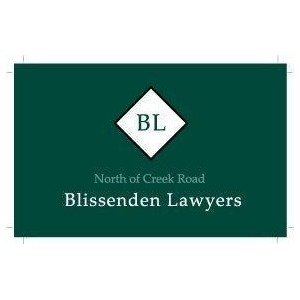Best Commercial Real Estate Lawyers in Moonah
Share your needs with us, get contacted by law firms.
Free. Takes 2 min.
Free Guide to Hiring a Real Estate Lawyer
List of the best lawyers in Moonah, Australia
About Commercial Real Estate Law in Moonah, Australia
In Moonah, a suburb of Hobart in Tasmania, Australia, the Commercial Real Estate (CRE) sector is governed by several regulations and laws that help maintain relations between landlords, tenants, and buyers. These laws cover myriad areas, including property leasing, renting, constructing, sales, property management, property financing, and other real estate transactions. As with other aspects of Australian law, Commercial Real Estate laws in Moonah are complex and continually evolving in response to market trends and socio-economic factors.
Why You May Need a Lawyer
While you may navigate some real estate dealings without legal advice, certain situations necessitate professional legal help. These situations might include negotiating and clarifying terms in commercial contracts, ensuring adherence to relevant statutory laws, resolving property disputes, handling complications with financing, taxation, and conducting due diligence during property transactions. A lawyer can help ensure that your rights are protected and that you navigate such situations safely without potential legal pitfalls.
Local Laws Overview
The local laws governing Commercial Real Estate in Moonah typically involve property title transfers, lease agreements, property development guidelines, dispute resolution mechanisms, and land use regulations. For instance, the Property Agents and Land Transactions Act 2016 is one law that sets standards for the operation of real estate agencies and estate agents. An understanding of these laws is crucial in preventing costly mistakes or potential legal disputes.
Frequently Asked Questions
What are the key legal steps in a Commercial Real Estate transaction?
The specific legal steps can differ based on circumstances, but generally, they involve negotiating terms, conducting due diligence, drafting and reviewing contracts, completing financial transactions, and transferring titles.
Can I handle my Commercial Real Estate transaction without a lawyer?
While it's possible, it's generally not recommended due to the complexities of Commercial Real Estate law. Without proper legalese knowledge, you may overlook critical clauses or inadvertently breach a law or regulation.
What is due diligence in a Commercial Real Estate transaction?
Due diligence involves conducting a thorough investigation into a property before a transaction. This process typically includes assessing the property's financial performance, legal status, physical condition, and other pertinent details.
What happens if there's a dispute related to my Commercial Real Estate?
In case of a dispute, you generally have the right to pursue a resolution through legal avenues such as litigation, mediation, or arbitration.
How is Commercial Real Estate different from Residential Real Estate?
Commercial and Residential Real Estate differ in their intended use, financing options, returns on investment, regulations, and contract terms. Therefore, legal considerations for both also differ significantly.
Additional Resources
For additional help, you may reach out to the Australian Property Institute (API) and the Real Estate Institute of Tasmania (REIT). They both offer valuable resources for understanding Commercial Real Estate. Furthermore, official government websites provide access to all relevant laws and regulations.
Next Steps
If you need legal assistance in Commercial Real Estate, the first step is to identify your needs and collect all relevant documents. Subsequently, seek out a lawyer or legal firm specializing in Commercial Real Estate law. Prepare all your questions and doubts before your consultation to ensure you make the most of your interaction with your lawyer.
Lawzana helps you find the best lawyers and law firms in Moonah through a curated and pre-screened list of qualified legal professionals. Our platform offers rankings and detailed profiles of attorneys and law firms, allowing you to compare based on practice areas, including Commercial Real Estate, experience, and client feedback.
Each profile includes a description of the firm's areas of practice, client reviews, team members and partners, year of establishment, spoken languages, office locations, contact information, social media presence, and any published articles or resources. Most firms on our platform speak English and are experienced in both local and international legal matters.
Get a quote from top-rated law firms in Moonah, Australia — quickly, securely, and without unnecessary hassle.
Disclaimer:
The information provided on this page is for general informational purposes only and does not constitute legal advice. While we strive to ensure the accuracy and relevance of the content, legal information may change over time, and interpretations of the law can vary. You should always consult with a qualified legal professional for advice specific to your situation.
We disclaim all liability for actions taken or not taken based on the content of this page. If you believe any information is incorrect or outdated, please contact us, and we will review and update it where appropriate.








